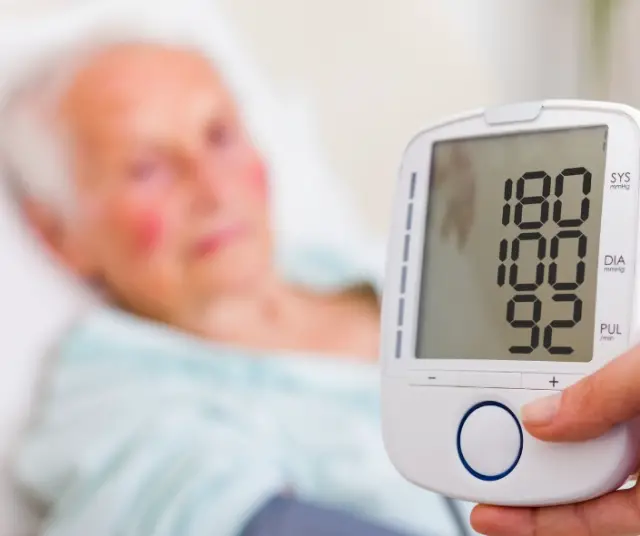Hypertension, commonly known as high blood pressure, is a chronic medical condition that affects millions of people around the world. It is often called the "silent killer" because, in its early stages, it has no obvious symptoms. However, hypertension should not be underestimated as it can have serious health consequences if not properly controlled.
What is Hypertension?
Hypertension is a medical condition in which the force of blood against the walls of the arteries is consistently too high. Blood pressure is measured in millimeters of mercury (mm Hg) and is expressed in two numbers: systolic pressure and diastolic pressure. Systolic pressure represents the force of the blood when the heart beats, while diastolic pressure represents the force when the heart is at rest between beats. Normal blood pressure is generally considered to be around 120/80 mm Hg.
However, hypertension is considered when blood pressure persists above 130/80 mm Hg for a prolonged period. Hypertension is classified into three stages:
- Stage 1 Hypertension: Blood pressure ranges between 130-139/80-89 mm Hg.
- Stage 2 Hypertension: Blood pressure is equal to or greater than 140/90 mm Hg.
- Emergency Hypertension: Blood pressure reaches dangerously high levels and requires immediate medical attention.
It is important to note that hypertension does not always present notable symptoms in its early stages, which means that many people are not aware that they have it until serious complications develop.
Causes and Risk Factors
Hypertension can be caused by a variety of factors, and in many cases, it is not possible to identify a specific cause. However, there are several well-established risk factors that can increase the likelihood of developing hypertension. Some of the most common causes and risk factors include:
Genetics : Genetic predisposition plays an important role in hypertension. If you have a family history of hypertension, you are more likely to develop the condition yourself.
Age : Hypertension tends to increase with age. As we age, arteries can become less flexible and more likely to harden, which increases blood pressure.
Lifestyle: Factors such as an unhealthy diet, excessive salt consumption, lack of physical activity, smoking and excessive alcohol consumption can significantly contribute to hypertension.
Obesity : Excess body weight puts additional pressure on the cardiovascular system and can increase blood pressure.
Underlying Diseases: Medical conditions such as diabetes, kidney disease and hormonal disorders can contribute to hypertension.
Stress: Chronic stress can temporarily raise blood pressure, and if left uncontrolled, can contribute to hypertension in the long term.
Medications: Some medications, such as oral contraceptives, steroids, and decongestants, can increase blood pressure.
Sodium Intake : A diet high in sodium can cause fluid retention and increase blood pressure.
Alcohol and Tobacco Use: Excessive drinking and tobacco smoking are known risk factors for hypertension.
Sleep Apnea: Sleep apnea, a disorder in which breathing is interrupted during sleep, can contribute to hypertension.
Diagnosis of Hypertension
Hypertension is usually diagnosed through blood pressure measurement. Doctors use a sphygmomanometer or blood pressure monitor to measure a patient's blood pressure. The measurement is taken on the arm and is expressed in millimeters of mercury (mm Hg). For an accurate diagnosis, multiple measurements are usually taken at different times.
It is important to note that hypertension is a chronic condition, so the diagnosis is not based on a single high blood pressure reading. Doctors usually monitor blood pressure regularly over a period of time before confirming the diagnosis of hypertension.
Complications of Hypertension
Untreated or poorly controlled hypertension can have serious health consequences. Some of the most common complications include:
Cardiovascular Diseases: Hypertension is a major risk factor for cardiovascular diseases, such as heart disease, heart failure, stroke, and peripheral artery disease.
Kidney Disease: High blood pressure can damage the blood vessels in the kidneys, which can lead to chronic kidney disease or kidney failure.
Vision Problems: Hypertension can damage blood vessels in the retina, which can cause vision problems, including vision loss.
Aneurysm: High blood pressure increases the risk of developing aneurysms, which are weakened areas of blood vessels that can rupture and cause life-threatening internal bleeding.
Brain Problems: Uncontrolled hypertension can damage blood vessels in the brain, increasing the risk of dementia and other cognitive problems.
Prevention and Treatment
Fortunately, hypertension can be prevented and effectively controlled with lifestyle changes and, in some cases, prescription medications. Here are some key strategies to prevent and treat hypertension:
Healthy Diet: Reduce sodium intake and eat a diet rich in fruits, vegetables, whole grains, and lean proteins.
Weight Control: Maintaining a healthy body weight reduces pressure on the cardiovascular system.
Regular Exercise: Regular physical activity can help lower blood pressure and improve overall health.
Limit Alcohol and Tobacco: Reduce or eliminate alcohol consumption and quit smoking.
Reduce Stress: Practice stress management techniques, such as meditation and relaxation.
Medications: If necessary, your doctor may prescribe medications to help control your blood pressure.
Regular Medical Checkup: Get regular medical checkups to monitor your blood pressure and detect any changes in time.
Hypertension is a serious medical condition that affects millions of people around the world. Although it is often called the "silent killer" due to the lack of obvious symptoms in its early stages, it should not be underestimated. With proper care and lifestyle changes, hypertension can be effectively prevented and controlled. Education and awareness are key in the fight against this disease, so it is important to know the risk factors and take steps to maintain healthy blood pressure. Preventing and treating hypertension can make a big difference in long-term cardiovascular health.
